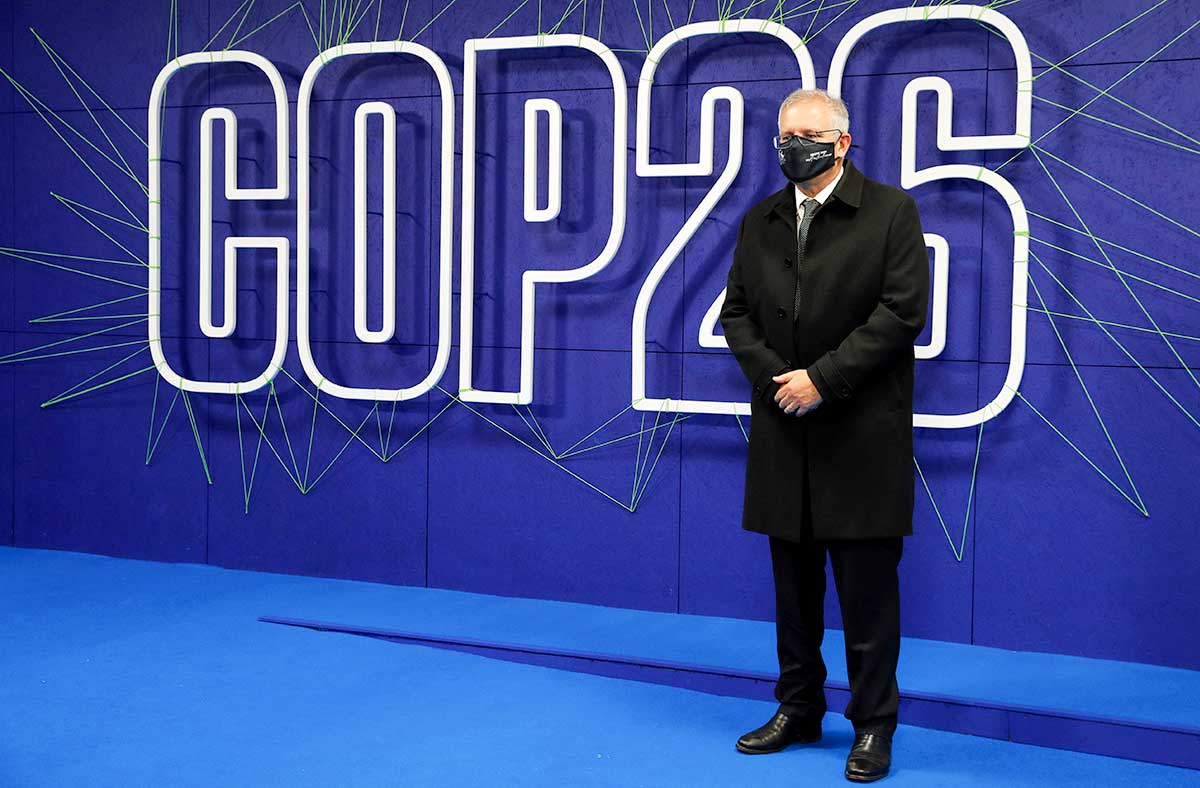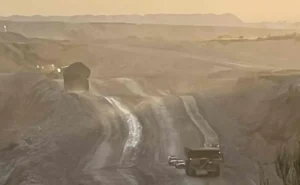Monday in Glasgow saw the COP26 climate talks kick-off in earnest, with the “World Leaders Summit” a forum to announce new and updated pledges to reduce emissions, invest in green technologies and provide support and finance for developing countries to undertake sustainable development.
UK prime minister Boris Johnson launched COP26 by comparing the current challenge of climate change to a James Bond style ‘doomsday device’, US president Joe Biden offered an apology for the actions of the Trump administration, and both India and Canada announced major new commitments to reduce their dependence on fossil fuels.
And while Australia officially joined the growing list of countries committed to net zero emissions by 2050, it wasn’t enough for it to avoid being labelled a “fossil of the day” by environment groups.
Australia and UK gets first Fossil of the Day awards
Each day during UN climate talks, environmental groups issue ‘fossil of the day’ awards to countries that are deemed to have sought to undermine progress, or have failed to meet expectations when it comes to taking action.
On Day 1 on of COP26, Australia was issued one of the first ‘fossil of the day’ awards, for its failure to commit to a stronger 2030 emissions reduction target.
“The Aussies are already excelling in heading for rock bottom this COP. They’ve not only spectacularly failed to deliver ambitious contributions (NDC) but have also approved three new coal projects in the last months,” the Climate Action Network said.
The United Kingdom, as the hosts of COP26, were also awarded a ‘fossil of the day’ for their failure to manage participation of delegates from civil society with Covid-19 measures forcing delegates to wait in long queues to gain access to venues.
The first 🏆#FossiloftheDay🦖 Award🏆 @COP26 goes to…
🇬🇧#COP26 UK Presidency for failing to make it the ‘the most inclusive COP ever’
🇦🇺 Australia – a close 2nd, for lack of ambitious NDCs, 3 new coal projects and no plans to phase out fossils
👎👎👎 https://t.co/TLel4wwW9y pic.twitter.com/x0rq1XnFXZ
— Climate Action Network International (CAN) (@CANIntl) November 1, 2021
Boris Johnson compares climate to ‘James Bond doomsday device’
Representing the hosts of COP26, UK prime minister Boris Johnson said climate change had placed the world in a similar position to fictional British spy James Bond, “strapped to a doomsday device”, as it tries to deal with the urgent threat.
“We are in roughly the same position, my fellow global leaders, as James Bond today,” Johnson said.
“Except that the tragedy is that this is not a movie, and the doomsday device is real and the clock is ticking to the furious rhythm of hundreds of billions of pistons and turbines and furnaces and engines with which we are pumping carbon into the air faster and faster- record outputs and quilting the earth in an invisible and suffocating blanket of CO2 desperately trying to work out which coloured wire to pull to turn it off.”
“We may not feel much like James Bond. Not all of us necessarily look like James Bond. But we have the opportunity, the duty, to make this summit the moment when humanity finally began – and I stress began – to defuse that bomb and make this the moment when we began irrefutably to turn the tide and to begin the fightback against climate change,” Johnson added.
This is the queue, to get into the queue to get into security, to get into #COP26 . It’s a wait in 9 degrees too. pic.twitter.com/h27dgzGiif
— Isabella Higgins (@isabellahiggins) November 1, 2021
No More ‘blah blah blah’
The COP26 organisers have continued to struggle to manage the number of people accessing the venues. Organisers have been trying to limit physical attendance within the venues to manage Covid-19 risks, but with world leaders addressing the talks on Monday, demand for access has been high.
But, outside of the COP26 venues, youth climate activist Greta Thunberg addressed campaigners, saying that she did not think world leaders were taking the challenge of climate change seriously.
“Inside COP, there are just politicians and people in power pretending to our future seriously, pretending to take the present seriously of the people already today are being effected by the climate crisis,” Thunberg said.
“We say no more blah blah blah, no more exploitation of people, nature and the planet. No more whatever the f**k they are doing inside there.”
"No more 'blah blah blah.' No more whatever the fuck they're doing inside there."
— Climate activist Greta Thunberg outside the UN climate summit pic.twitter.com/FntpSOyMvr
— The Recount (@therecount) November 1, 2021
Morrison delivers tired rhetoric to world stage
In Scott Morrison’s first major address to COP26, the prime minister mostly deployed the same messaging as he has used at home, saying Australia would “meet and beat” its targets under the Paris Agreement, while refusing to set a stronger target for 2030.
Morrison used very careful language in reference to Australia’s Nationally Determined Contribution – its official targets under the Paris Agreement – pointing to the ‘projections’ contained within the NDC to suggest Australia was on track for a 35 per cent emissions reduction by 2030, without saying it was a formal target.
“We have already reduced emissions in Australia by more than 20 per cent since 2005,” Morrison said.
“And by 2030, our national determined contribution here at COP26 notes that our emissions in Australia will fall by 35 per cent by 2030, far exceeding our Paris commitment. Australia meets and beats our commitments,” Morrison added.
After spending much of the last few years playing down the significance of global commitments to net zero targets, Morrison did appear to acknowledge that, in fact, quite a large proportion of the global economy is committed to decarbonisation.
“Countries with net zero commitments cover over 80 per cent of the world’s GDP, and in Australia’s case, 90 per cent of our exports are to countries with net zero commitments,” Morrison told the conference.
Morrison announced that Australia would increase its commitment to international climate finance to $2 billion a year, adding an additional $500 million, which will be directed to the Pacific and South-East Asian region.
“The increase in Australia’s $2 billion commitment to climate finance is welcome, but it will achieve little to assist developing countries to mitigate and adapt to climate change when Australia’s refuses to cut its addiction to fossil fuels,” the Australian Conservation Foundation’s climate manager Gavan McFadzean said.
The United States Apologises
US president Joe Biden used his opening remarks to the COP26 conference to offer an apology on behalf of the United States for the actions of the Trump administration, which withdrew the country from the Paris Agreement.
Biden has sought to re-integrate the United States back into the international fold when it comes to climate change talks,
“I do apologise for the fact the United States in the last administration pulled out of the Paris Accords and put us behind the eight-ball a little bit,” Biden said.
Biden called on other countries to lift their Paris Agreement targets to ensure a goal of limiting global warming to just 1.5 degrees remained in reach.
“We’ve set ambitious goals of reducing US greenhouse gas emissions by 50 to 52 per cent, below 2005 levels by 2030. That’s a goal line with limiting global warming to 1.5 degrees Celsius,” Biden said.
“But the math only works if every country does its part, and those countries that don’t have the wherewithal get the kind of help they need. Every major economy needs to enhance its Paris targets in my view, to get to a level that will keep our goal within reach and then and then continue to raise our standards.”
BIDEN: “I guess I shouldn’t apologize, but I do apologize for the fact that the United States, in the last administration, pulled out of the Paris accords and put us sort of behind the 8 ball.” pic.twitter.com/rzPGpTlLSb
— Zach Purser Brown (@zachjourno) November 1, 2021
Canada to cease coal exports, cap oil and gas emissions
Canadian prime minister Justin Trudeau announced new commitments for Canada around the use of coal, agreeing to phase out the use of coal for electricity production by 2030, as well as introducing a new ban on coal exports.
Significantly, Trudeau announced that Canada would cap emissions from the oil and gas sectors, with immediate effect.
“We are the first major oil and gas producing nation to do this. Of course, we’ve made a promise to the workers in the sector that we’ll be there for them and their families into this brighter future,” Trudeau said.
“We urge other major oil and gas producing nations to join us, because words aren’t enough to secure strong future economies for our citizens and bright futures for our kids.”
India commits to Net Zero… by 2070
Indian prime minister Narendra Modi announced that he would commit to a net zero target for 2070, seeing India join the growing list of countries with a formal decarbonisation target, but on a timeframe that exceeds what many see as a critical goal that needs to be reached by 2050 at the latest.
As part of a series of five new commitments, Modi said that India would increase its non-fossil fuel generation capacity to 500GW by 2030, and it would source at least half of its energy from renewable energy sources over the same time frame.
It’s a significant new development from a country that is one of the biggest buyers of Australian coal. (And it adds to the 1.2TW of renewable capacity promised by China out to 2030).
Modi added that he expected the more affluent countries to make $1 trillion in climate finance available as soon as possible.
“Justice would demand that those nations that have not kept their climate commitments should be pressured,” Modi said.










